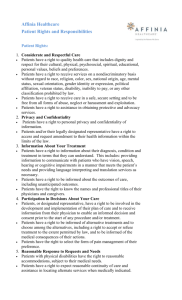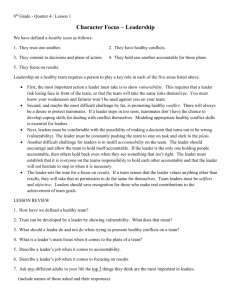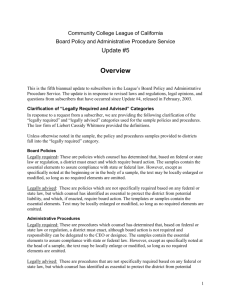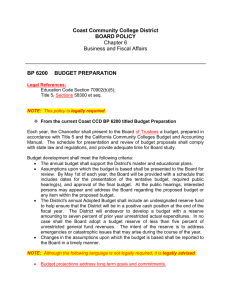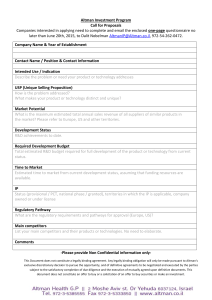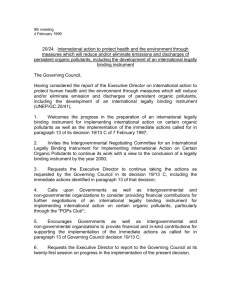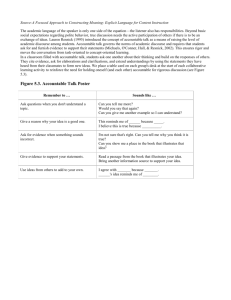Tort Law
advertisement
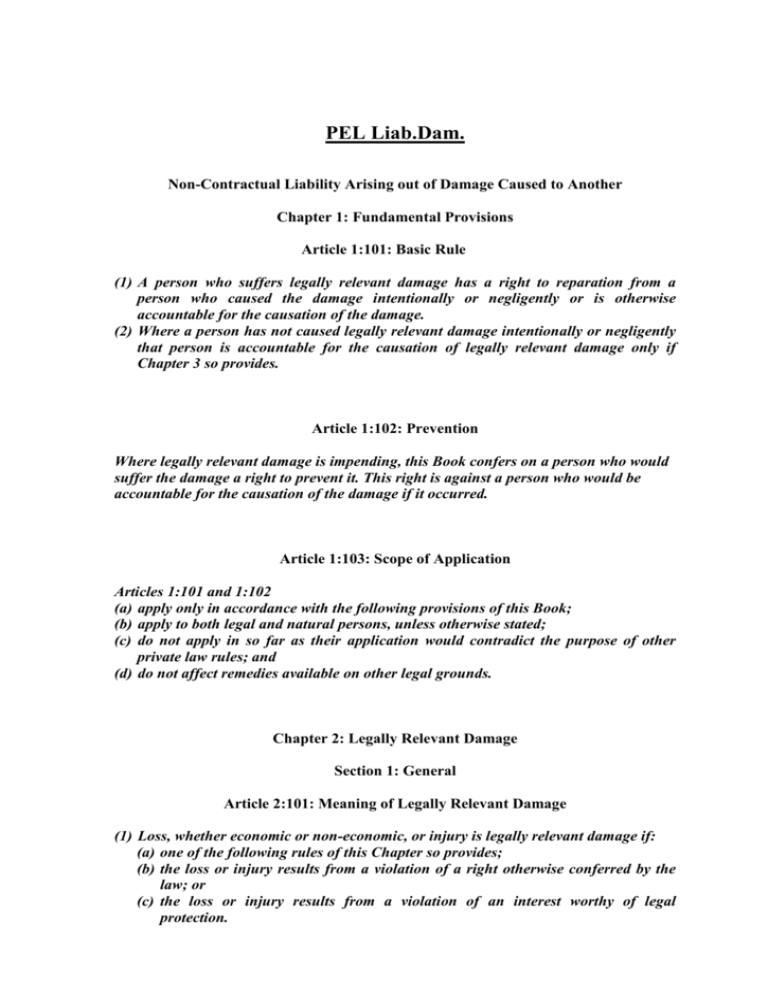
PEL Liab.Dam. Non-Contractual Liability Arising out of Damage Caused to Another Chapter 1: Fundamental Provisions Article 1:101: Basic Rule (1) A person who suffers legally relevant damage has a right to reparation from a person who caused the damage intentionally or negligently or is otherwise accountable for the causation of the damage. (2) Where a person has not caused legally relevant damage intentionally or negligently that person is accountable for the causation of legally relevant damage only if Chapter 3 so provides. Article 1:102: Prevention Where legally relevant damage is impending, this Book confers on a person who would suffer the damage a right to prevent it. This right is against a person who would be accountable for the causation of the damage if it occurred. Article 1:103: Scope of Application Articles 1:101 and 1:102 (a) apply only in accordance with the following provisions of this Book; (b) apply to both legal and natural persons, unless otherwise stated; (c) do not apply in so far as their application would contradict the purpose of other private law rules; and (d) do not affect remedies available on other legal grounds. Chapter 2: Legally Relevant Damage Section 1: General Article 2:101: Meaning of Legally Relevant Damage (1) Loss, whether economic or non-economic, or injury is legally relevant damage if: (a) one of the following rules of this Chapter so provides; (b) the loss or injury results from a violation of a right otherwise conferred by the law; or (c) the loss or injury results from a violation of an interest worthy of legal protection. (2) In any case covered only by sub-paragraphs (b) or (c) of paragraph (1) loss or injury constitutes legally relevant damage only if it would be fair and reasonable for there to be a right to reparation or prevention, as the case may be, under articles 1:101 or 1:102. (3) In considering whether it would be fair and reasonable for there to be a right to reparation or prevention regard is to be had to the ground of accountability, to the nature and proximity of the damage or impending damage, to the reasonable expectations of the person who suffers or would suffer the damage, and to considerations of public policy. (4) In this Book (a) economic loss includes loss of income or profit, burdens incurred and a reduction in the value of property (b) non-economic loss includes pain and suffering and impairment of the quality of life. Section 2: Particular Instances of Legally Relevant Damage Article 2:201: Personal Injury and Consequential Loss (1) Loss caused to a natural person as a result of injury to his or her body or health and the injury as such are legally relevant damage. (2) In this Book: (a) such loss includes the costs of health care including expenses reasonably incurred for the care of the injured person by those close to him or her; and (b) personal injury includes injury to mental health only if it amounts to a medical condition. Article 2:202: Loss Suffered by Third Persons as a Result of Another’s Personal Injury or Death (1) Non-economic loss caused to a natural person as a result of another’s personal injury or death is legally relevant damage if at the time of injury that person is in a particularly close personal relationship to the injured person. (2) Where a person has been fatally injured: (a) legally relevant damage caused to the deceased on account of the injury to the time of death becomes legally relevant damage to the deceased’s successors; (b) reasonable funeral expenses are legally relevant damage to the person incurring them; and (c) loss of maintenance is legally relevant damage to a natural person whom the deceased maintained or, had death not occurred, would have maintained under statutory provisions or to whom the deceased provided care and financial support. Article 2:203: Infringement of Dignity, Liberty and Privacy (1) Loss caused to a natural person as a result of infringement of his or her right to respect for his or her dignity, such as the rights to liberty and privacy, and the injury as such are legally relevant damage. (2) Loss caused to a person as a result of injury to that person’s reputation and the injury as such are also legally relevant damage if national law so provides. Article 2:204: Loss upon Communication of Incorrect Information about Another Loss caused to a person as a result of the communication of information about that person which the person communicating the information knows or ought to know is incorrect is legally relevant damage. Article 2:205: Loss upon Breach of Confidence Loss caused to a person as a result of the communication of information which, either from its nature or the circumstances in which it was obtained, the person communicating the information knows or ought to know is confidential to the person suffering the loss is legally relevant damage. Article 2:206: Loss upon Infringement of Property or Lawful Possession (1) Loss caused to a person as a result of an infringement of that person’s property right or lawful possession of a movable or immovable thing is legally relevant damage. (2) In this Article: (a) loss includes being deprived of the use of property; (b) infringement of a property right includes destruction of or physical damage to the subject-matter of the right (property damage), disposition of the right, interference with its use and other disturbance of the exercise of the right. Article 2:207: Loss upon Reliance on Incorrect Advice or Information Loss caused to a person as a result of making a decision in reasonable reliance on incorrect advice or information is legally relevant damage if: (a) the advice or information is provided by a person in pursuit of a profession or in the course of trade; and (b) the provider knew or ought to have known that the recipient would rely on the advice or information in making a decision of the kind made. Article 2:208: Loss upon Unlawful Impairment of Business (1) Loss caused to a person as a result of an unlawful impairment of that person’s exercise of a profession or conduct of a trade is legally relevant damage. (2) Loss caused to a consumer as a result of unfair competition is also legally relevant damage if Community or national law so provides. Article 2:209: Burdens incurred by the State upon Environmental Impairment Burdens incurred by the State or designated competent authorities in restoring substantially impaired natural elements constituting the environment, such as air, water, soil, flora and fauna, are legally relevant damage to the State or the authorities concerned. Article 2:210: Loss upon Fraudulent Misrepresentation (1) Without prejudice to the other provisions of this section loss caused to a person as a result of another’s fraudulent misrepresentation, whether by words or conduct, is legally relevant damage. (2) A misrepresentation is fraudulent if it is made with knowledge or belief that the representation is false and it is intended to induce the recipient to make a mistake. Article 2:211: Loss upon Inducement of Breach of Obligation Without prejudice to the other provisions of this section, loss caused to a person as a result of another’s inducement of a third person to breach an obligation is legally relevant damage only if: (a) the obligation was owed to the person sustaining the loss; and (b) the person inducing the breach: (i) intended the third person to breach the obligation, and (ii) did not act in legitimate protection of their own interest. Chapter 3: Accountability Section 1: Intention and Negligence Article 3:101: Intention A person causes legally relevant damage intentionally when that person causes such damage either: (a) meaning to cause damage of the type caused; or (b) by conduct which that person means to do, knowing that such damage, or damage of that type, will or will almost certainly be caused. Article 3:102: Negligence A person causes legally relevant damage negligently when that person causes the damage by conduct which either: (a) does not meet the particular standard of care provided by a statutory provision whose purpose is the protection of the injured person from the damage suffered, or (b) does not otherwise amount to such care as could be expected from a reasonably careful person in the circumstances of the case. Article 3:103: Persons under Eighteen (1) A person under eighteen years of age is only accountable for causing legally relevant damage according to Article 3:102(b) in so far as that person does not exercise such care as could be expected from a reasonably careful person of the same age in the circumstances of the case. (2) A person under seven years of age is not accountable for causing damage intentionally or negligently. (3) However, paragraphs (1) and (2) do not apply to the extent that (a) the injured person cannot obtain reparation under this Book from another, and (b) liability to make reparation would be equitable having regard to the financial means of the parties and all other circumstances of the case. Article 3:104: Accountability for Damage Caused by Children or Supervised Persons (1) Parents or other persons obliged by law to provide parental care for a person under fourteen years of age are accountable for the causation of legally relevant damage where that person under age caused the damage by conduct that would constitute intention or negligence if it were the conduct of an adult. (2) An institution or other body obliged to supervise a person is accountable for the causation of legally relevant damage suffered by a third party when: (a) the damage is personal injury, loss within Article 2:202 or property damage; (b) the person whom the institution or other body is obliged to supervise caused that damage intentionally or negligently or, in the case of a person under eighteen, by conduct that would constitute intention or negligence if it were the conduct of an adult; and (c) the person whom they are obliged to supervise is a person likely to cause damage of that type. (3) However, a person is not accountable under this Article for the causation of damage if that person shows that there was no defective supervision of the person causing the damage. Section 2: Accountability without Intention or Negligence Article 3:201: Accountability for Damage Caused by Employees and Representatives (1) A person who employs or similarly engages another, is accountable for the causation of legally relevant damage suffered by a third person when the person employed or engaged (a) caused the damage in the course of employment or engagement, and (b) caused the damage intentionally or negligently, or is otherwise accountable for the causation of the damage. (2) Paragraph (1) applies correspondingly to a legal person in relation to a representative causing damage in the course of their engagement. A representative is a person who is authorised to effect juridical acts on behalf of the legal person by its constitution. Article 3:202: Accountability for Damage Caused by the Unsafe State of an Immovable (1) A person who independently exercises control over an immovable is accountable for the causation of personal injury and consequential loss, loss within Article 2:202, and loss resulting from property damage (other than to the immovable itself) by a state of the immovable which does not ensure such safety as a person in or near the immovable is entitled to expect having regard to the circumstances including: (a) the nature of the immovable, (b) the access to the immovable, and (c) the cost of avoiding the immovable being in that state. (2) A person exercises independent control over an immovable if that person exercises such control that it is reasonable to impose a duty on that person to prevent legally relevant damage within the scope of this Article. (3) The owner of the immovable is to be regarded as independently exercising control, unless the owner shows that another independently exercises control. Article 3:203: Accountability for Damage Caused by Animals A keeper of an animal is accountable for the causation by the animal of personal injury and consequential loss, loss within Article 2:202, and loss resulting from property damage. Article 3:204: Accountability for Damage Caused by Defective Products (1) The producer of a product is accountable for the causation of personal injury and consequential loss, loss within Article 2:202, and, in relation to consumers, loss resulting from property damage (other than to the product itself) by a defect in the product. (2) A person who imported the product into the European Economic Area for sale, hire, leasing or distribution in the course of that person’s business is accountable correspondingly. (3) A supplier of the product is accountable correspondingly if: (a) the producer cannot be identified; or (b) in the case of an imported product, the product does not indicate the identity of the importer (whether or not the producer’s name is indicated), unless the supplier informs the injured person, within a reasonable time, of the identity of the producer or the person who supplied that supplier with the product. (4) A person is not accountable under this article for the causation of damage if that person shows: (a) that person did not put the product into circulation; (b) it is probable that the defect which caused the damage did not exist at the time that person put the product into circulation; (c) that person neither manufactured the product for sale or distribution for economic purpose nor manufactured or distributed it in the course of business; (d) the defect is due to the product’s compliance with mandatory regulations issued by public authorities; (e) the state of scientific and technical knowledge at the time that person put the product into circulation did not enable the existence of the defect to be discovered; or (f) in the case of a manufacturer of a component, the defect is attributable to: (i) the design of the product into which the component has been fitted, or (ii) instructions given by the manufacturer of the product. (5) “Producer” means: (a) in the case of a finished product or a component, the manufacturer; (b) in the case of raw material, the person who abstracts or wins it; and (c) any person who, by putting their name, trade mark or other distinguishing feature on the product, presents themselves as its producer. (6) “Product” means a movable, even if incorporated into another movable or an immovable, or electricity. (7) A product is defective if it does not provide the safety which a person is entitled to expect, having regard to the circumstances including: (a) the presentation of the product; (b) the use to which it could reasonably be expected that the product would be put; and (c) the time when the product was put into circulation, but a product is not defective merely because a better product is subsequently put into circulation. Article 3:205: Accountability for Damage Caused by Motor Vehicles (1) A keeper of a motor vehicle is accountable for the causation of personal injury and consequential loss, loss within Article 2:202, and loss resulting from property damage (other than to the vehicle and its freight) in a traffic accident which results from the use of the vehicle. (2) “Motor vehicle” means any vehicle intended for travel on land and propelled by mechanical power, but not running on rails, and any trailer, whether or not coupled. Article 3:206: Accountability for Damage Caused by Dangerous Substances or Emissions (1) A keeper of a substance or an operator of an installation is accountable for the causation by that substance or by emissions from that installation of personal injury and consequential loss, loss within Article 2:202, loss resulting from property damage, and burdens within Article 2:209, if: (a) having regard to their quantity and attributes, at the time of the emission, or, failing an emission, at the time of contact with the substance it is very likely that the substance or emission will cause such damage unless adequately controlled, and (b) the damage results from the realisation of that danger. (2) “Substance” includes chemicals (whether solid, liquid or gaseous). Microorganisms are to be treated like substances. (3) “Emission” includes (a) the release or escape of substances, (b) the conduction of electricity, (c) heat, light and other radiation, (d) noise and other vibrations, and (e) other incorporeal impact on the environment. (4) “Installation” includes a mobile installation and an installation under construction or not in use. (5) However, a person is not accountable for the causation of damage under this Article if that person: (a) does not keep the substance or operate the installation for purposes related to that person’s trade, business or profession; or (b) shows that there was no failure to comply with statutory standards of control of the substance or management of the installation. Article 3:207: Other Accountability for the Causation of Legally Relevant Damage A person is also accountable for the causation of legally relevant damage if national law so provides where it (a) relates to a source of danger which is not within Articles 3:104 - 3:205, (b) relates to substances or emissions, or (c) disapplies Article 3:204 (4)(e). Article 3:208: Abandonment For the purposes of this section, a person remains accountable for an immovable, vehicle, substance or installation which that person abandons until another exercises independent control over it or becomes its keeper or operator. This applies correspondingly, so far as reasonable, in respect of a keeper of an animal. Chapter 4: Causation Article 4:101: General Rule (1) A person causes legally relevant damage to another if the damage is to be regarded as a consequence of that person’s conduct or the source of danger for which that person is responsible. (2) In cases of personal injury or death the injured person’s predisposition with respect to the type or extent of the injury sustained is to be disregarded. Article 4:102: Collaboration A person who participates with, instigates or materially assists another in causing legally relevant damage is to be regarded as causing that damage. Article 4:103: Alternative Causes Where legally relevant damage may have been caused by any one or more of a number of occurrences for which different persons are accountable and it is established that the damage was caused by one of these occurrences but not which one, each person who is accountable for any of the occurrences is rebuttably presumed to have caused that damage. Chapter 5: Defences Section 1: Consent or Conduct of the Injured Person Article 5:101: Consent and Acting at own Risk (1) A person has a defence if the injured person validly consents to the legally relevant damage and is aware or ought to be aware of the consequences of that consent. (2) The same applies if the injured person, knowing the risk of damage of the type caused, voluntarily exposes himself to that risk and is to be regarded as accepting it. Article 5:102: Contributory Fault and Accountability (1) Where the injured person contributes by their own fault to the occurrence or extent of legally relevant damage, reparation is to be reduced according to their degree of fault. (2) However, no regard is to be had to: (a) an insubstantial fault of the injured person; (b) fault or accountability whose contribution to the causation of the damage is insubstantial; (c) the injured person’s want of care contributing to that person’s personal injury caused by a motor vehicle in a traffic accident, unless that want of care constitutes profound failure to take such care as is manifestly required in the circumstances. (3) Paragraphs (1) and (2) apply correspondingly where a person for whom the injured person is responsible within the scope of Article 3:201 contributes by their fault to the occurrence or extent of the damage. (4) Compensation is to be reduced likewise if and in so far as any other source of danger for which the injured person is responsible under Chapter 3 contributes to the occurrence or extent of the damage. Article 5:103: Damage Caused by a Criminal to a Collaborator Legally relevant damage caused unintentionally in the course of committing a criminal offence to another person participating or otherwise collaborating in the offence does not give rise to a right to reparation if this would be contrary to public policy. Section 2: Interests of Accountable Persons or Third Parties Article 5:201: Authority Conferred by Law A person has a defence if legally relevant damage is caused with authority conferred by law. Article 5:202: Self-Defence, Benevolent Intervention and Necessity (1) A person has a defence if that person causes legally relevant damage in reasonable protection of a right or of an interest worthy of legal protection of that person or a third person if the person suffering the legally relevant damage is accountable for endangering the right or interest protected. For the purposes of this paragraph Article 3:103 is to be disregarded. (2) The same applies to legally relevant damage caused by a benevolent intervener to a principal without breach of the intervener’s duties. (3) Where a person causes legally relevant damage to the patrimony of another in a situation of imminent danger to life, body, health or liberty in order to save himself or a third person and that danger could not be eliminated without causing the damage, the person causing the damage is not liable to make reparation beyond providing reasonable recompense. Article 5:203: Protection of Public Interest A person has a defence if legally relevant damage is caused in necessary protection of values fundamental to a democratic society, in particular where damage is caused by dissemination of information in the media. Section 3: Inability to Control Article 5:301: Mental Incompetence (1) A person who is mentally incompetent at the time of conduct causing legally relevant damage is liable only if this is equitable, having regard to the mentally incompetent person’s financial means and all the other circumstances of the case. Liability is limited to reasonable recompense. (2) A person is to be regarded as mentally incompetent if that person lacks sufficient insight into the nature of his or her conduct, unless the lack of sufficient insight is the temporary result of his or her own misconduct. Article 5:302: Event beyond control A person has a defence if legally relevant damage is caused by an abnormal event which cannot be averted by any reasonable measure and which is not to be regarded as that person’s risk. Section 4: Contractual Exclusion and Limitation of Liability Article 5:401: Contractual Exclusion and Limitation of Liability (1) Liability for causing legally relevant damage intentionally cannot be excluded or restricted. (2) Liability for causing legally relevant damage as a result of a profound failure to take such care as is manifestly required in the circumstances cannot be excluded or restricted (a) in respect of personal injury (including fatal injury), or (b) if the exclusion or restriction is otherwise illegal or contrary to good faith and fair dealing. (3) Liability for damage for the causation of which a person is accountable under Article 3:204 cannot be restricted or excluded. (4) Other liability under this Book can be excluded or restricted unless statute provides otherwise. Section 5: Loss within Article 2:202 Art. 5:501: Extension of Defences against the Injured Person to Third Persons A defence which may be asserted against a person’s right of reparation in respect of that person’s personal injury or, if death had not occurred, could have been asserted, may also be asserted against a person suffering loss within Article 2:202. Chapter 6: Remedies Section 1: Reparation in General Article 6:101: Aim and Forms of Reparation (1) Reparation is to reinstate the person suffering the legally relevant damage in the position that person would have been in had the legally relevant damage not occurred. (2) Reparation may be in money (compensation) or otherwise, as is most appropriate, having regard to the kind and extent of damage suffered and all the other circumstances of the case. (3) Where a tangible object is damaged, compensation equal to its depreciation of value is to be awarded instead of the cost of its repair if the cost of repair unreasonably exceeds the depreciation of value. This rule applies to animals only if appropriate, having regard to the purpose for which the animal was kept. (4) As an alternative to reinstatement under paragraph (1), but only where this is reasonable, reparation may take the form of recovery from the person accountable for the causation of the legally relevant damage of any advantage obtained by the latter in connection with causing the damage. Article 6:102: De Minimis Rule Trivial damage is to be disregarded. Article 6:103: Equalisation of Benefits (1) Benefits arising to the person suffering legally relevant damage as a result of the damaging event are to be disregarded unless it would be fair and reasonable to take them into account. (2) In deciding whether it would be fair and reasonable to take the benefits into account, regard shall be had to the kind of damage sustained, the nature of the accountability of the person causing the damage and, where the benefits are conferred by a third party, the purpose of conferring those benefits. Article 6:104: Multiple Injured Persons Where multiple persons suffer legally relevant damage and reparation to one person will also make reparation to another, PECL Chapter 10 Section 2 applies with appropriate modification to their claims for reparation. Article 6:105: Solidary Liability (1) Where several persons are liable for the same legally relevant damage, they are liable solidarily. (2) As between the solidary debtors themselves the share of liability is equal unless different shares are more appropriate having regard to all circumstances of the case and in particular to fault or to the extent to which a source of danger mentioned in Chapter 3 contributed to the occurrence or extent of the damage. Article 6:106: Assignment of Claims The injured person may assign a claim for reparation, including a claim for reparation for non-economic loss. Section 2: Compensation Article 6:201: Injured Person’s Right of Election The injured person may choose whether or not to spend compensation on the reinstatement of their damaged interest. Article 6:202: Reduction of Liability Where it is fair and reasonable to do so, a person may be relieved of liability to compensate, either wholly or in part, if, where the damage is not caused intentionally, liability in full would be disproportionate to the accountability of the person causing the damage or the extent of the damage or the means to prevent it. Article 6:203: Capitalisation and Quantification (1) Compensation is to be awarded as a lump sum unless a good reason requires periodical payment. (2) National law determines how compensation for personal injury and non-economic loss is to be quantified. Article 6:204: Compensation for Injury as such Injury as such is to be compensated independent of compensation for economic or noneconomic loss. Section 3: Prevention Article 6:301: Right to Prevention (1) The right to prevention exists only in so far as a) reparation would not be an adequate alternative remedy; and b) it is reasonable for the person who would be accountable for the causation of the damage to prevent it from occurring . (2) Where the source of danger is an object or an animal and it is not reasonably possible for the endangered person to avoid the danger the right to prevention includes a right to have the source of danger removed. Article 6:302: Liability for Loss in Preventing Damage A person who has reasonably incurred expenditure or suffered other loss in order to prevent an impending damage from occurring to them, or in order to limit the extent or severity of a damage which occurs to them, has a right to compensation from the person who would have been accountable for the causation of the damage. Chapter 7: Ancillary Rules Article 7:101: National Constitutional Laws The provisions of this Book are to be interpreted and applied in a manner compatable with the constitutional law of the court. Article 7:102: Statutory Provisions National law determines what legal provisions are statutory provisions. Article 7:103: Public Law Functions and Court Proceedings This Book does not govern the liability of a person or body arising from the exercise or omission to exercise public law functions or from performing duties during court proceedings. Article 7:104: Liability of Employees, Employers, Trade Unions and Employers Associations This Book does not govern liability of (a) employees (whether to co-employees, employers or third parties) arising in the course of employment, (b) employers to employees arising in the course of employment, and (c) trade unions and employers associations arising in the course of industrial dispute. Article 7:105: Reduction or Exclusion of Liability to Indemnified Persons If a person is entitled from another source to reparation, whether in full or in part, for that person’s damage, in particular from an insurer, fund or other body, national law determines whether or not by virtue of that entitlement liability under this Book is limited or excluded.
